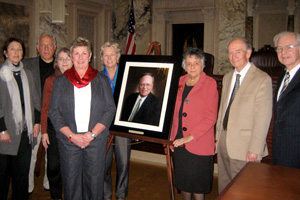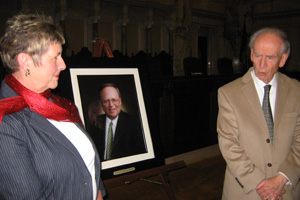
Attending the portrait presentation (from left) Susan Axelrod, Jon P. Axelrod, Kristin Crooks, Ann Milne, Justice Ann Walsh Bradley, Chief Justice Shirley S. Abrahamson, Justice N. Patrick Crooks, and Justice David T. Prosser Jr.

Ann Milne, Justice William A. Bablitch’s widow, listens to Justice N. Patrick Crooks’ remarks about his friend and colleague. Crooks accepted the portrait on behalf of the court, which will hang in the Capitol. The portrait is a gift from the Wisconsin Law Foundation to the citizens of Wisconsin.
Dec. 5, 2012 – Close friends, colleagues, and the widow of Wisconsin Supreme Court Justice William A. Bablitch (1941 – 2011) recently gathered in the Supreme Court Hearing Room to accept a portrait of Justice Bablitch, which will hang in the Capitol. The portrait is a gift to the citizens of Wisconsin from the Wisconsin Law Foundation (WLF). In 1965, the foundation began working with the Wisconsin Supreme Court to obtain pictures of all the justices who had served on the court.
Accepting the portrait on behalf of the Supreme Court, Justice N. Patrick Crooks recalled a time when his old friend was addressing a group of citizens in the Supreme Court Hearing Room. “What came across was how much he loved the whole fiber of the court, and it made a difference in my own feeling for the court. He also served in the legislature, as the majority leader in the State Senate. We are honored to accept this portrait on behalf of the court,” said Crooks.
Bablitch’s widow, Ann Milne, acknowledged the court and the foundation for honoring her husband. “Each one of you has played a significant and unique part in Bill's distinguished legal and public service career," said Milne. "It is an honor to know that his commitment to the state of Wisconsin and its citizens will be memorialized through this lovely portrait and its placement in our state Capitol. Thank you.”
Long Career of Public Service
Bablitch’s career of public service encompassed all three branches of government – as a public prosecutor, state legislator, and supreme court justice – and included two years in the Peace Corps in the late 1960s.
Bablitch became a Portage County district attorney in 1968. In 1972, he was elected state senator, relying on a grassroots campaign comprising mostly student volunteers. His proudest accomplishment in the Senate was passing revised sexual assault laws. He authored the bill and led the fight in the Legislature to modernize Wisconsin's antiquated rape law. The new law became a model for legislation nationwide.
He also authored the first campaign reform law, which restricted campaign spending and established public financing of political campaigns. Other leadership accomplishments in the Legislature include creating the Citizens' Utility Board, expanding mandatory reporting of child abuse, and passing the marital property law.
In 1983 Bablitch ran successfully for the Wisconsin Supreme Court. He authored many opinions supporting Wisconsin's environment, open government, consumer protection, and victim's rights. He authored a dissenting opinion in support of Wisconsin's hate crimes law, a position that the U.S. Supreme Court later adopted.
In 1995 Bablitch originated and planned the Judicial Glass Ceiling conference, encouraging women to enter the judiciary, which drew 250 attendees and inspired many women to seek judicial careers.
Upon retiring from the Supreme Court in 2003, Bablitch joined Michael Best & Friedrich as a partner, focusing on appellate practice, government and public policy, and alternative dispute resolution.
About the Wisconsin Law Foundation
The WLF, founded in 1951, is the charitable and educational arm of the State Bar of Wisconsin that serves to promote public understanding of the law, improvement of the administration of justice and other law-related public service through funding of innovative and creative programs that improve the vision of the American justice system. For more information or to join the Foundation, visit www.wisbar.org/wlf.
Deb Heneghan is the reporter for the State Bar of Wisconsin.
